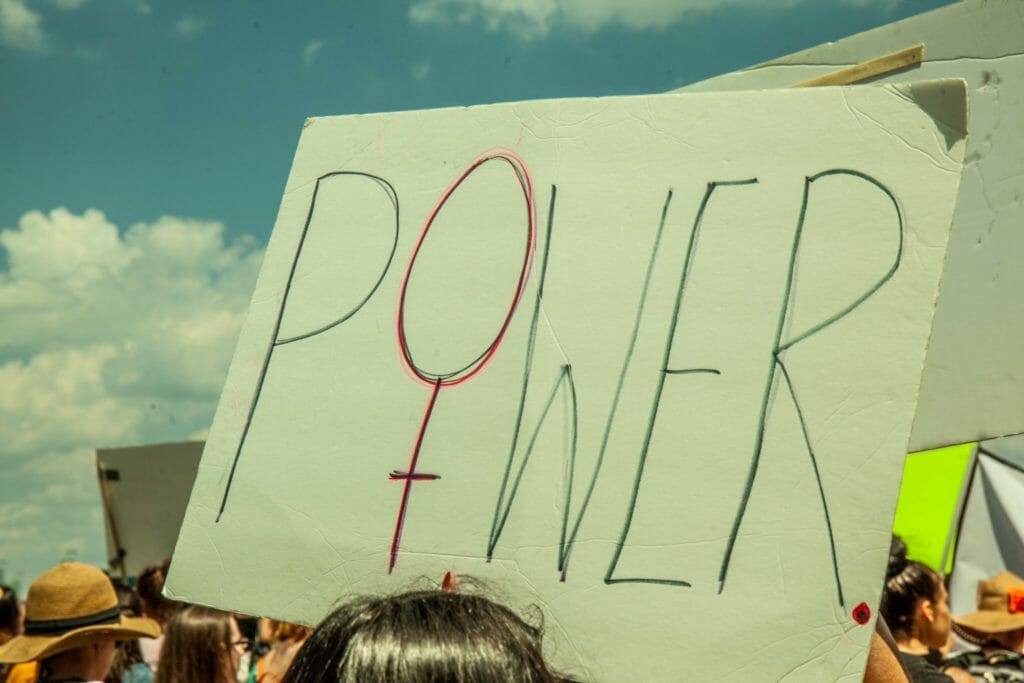The nation is alarmed by the bill’s provisions criminalizing activities like providing water to voters in long lines — but the bill contains plenty of other provisions that warrant sustained attention
ATLANTA — What has arguably been one of the busiest and most confusing legislative sessions in Georgia is now over, and there’s plenty of pieces of legislation to cover. (And we will; stay tuned for a more comprehensive recap covering what made it through the session.) But what’s bubbled into the limelight is SB 202, one of many voter suppression bills introduced by Georgia Republicans following the state’s record voter turnout and “blue wave.”
Over 50 voter suppression bills were introduced during session, and other pieces of legislation such as HB 531 flew up on the radar before SB 202. This bill, now signed by Gov. Brian Kemp and facing four lawsuits, began as a two-page piece of legislation. It then turned into 93 pages on Wed., March 17, immediately following the mass shootings in the metro Atlanta area that claimed eight lives, including six Asian women. It’s important to note that AAPI communities are especially disenfranchised, along with Black and brown communities, through voter suppression tactics, particularly ones like exact match which was spearheaded by Kemp before he made his way into the Governor’s Mansion.
Despite consecutive days of protest and strong opposition from the public — and even Georgia Secretary of State Brad Raffensperger’s own statement that Georgia’s elections last year ran smoothly and efficiently — SB 202 was signed behind closed doors by Gov. Kemp on Thurs., March 25, alongside six white male legislators, under an image of a plantation. Rep. Park Cannon, who is just one of four Black openly LGBTQ state legislators nationwide, was arrested by highway patrol officers for knocking on the governor’s door in an attempt to witness the signing of a bill that would, when enacted, affect millions of Georgia voters by creating numerous barriers to the ballot.
Kemp signed the bill into law just about an hour after it passed in chambers, which is a speedy and rare occurrence. Former Georgia state minority leader and Fair Fight Action founder Stacey Abrams publicly stated, “In 11 years, I never witnessed a massive bill approved at such speed and signed in such desperation.”
“The optics were poor from the beginning and made worse by Gov. Kemp,” said Sen. Elena Parent during a virtual legislative town hall on April 1, commenting on the nature of Kemp’s signing in conjunction with Rep. Cannon’s arrest. Since national attention has been turned to Georgia, with many declaring this legislation and Cannon’s arrest “Jim Crow 2.0,” including President Joe Biden, Kemp has made a lot of media appearances in attempts to change or take control of the narrative.
While SB 202 is simply one in a long line of many voter suppression tactics in Georgia that have continued for decades, it’s not often that the entire nation turns its neck to look or hold these tactics under a microscope. Since the state delivered the Democrats the much-needed Senate seat victories in January, it appears the country is more publicly invested than usual in what Georgia Republicans pull in the state legislature.
In its transformation from a two-pager to an omnibus voter suppression bill, Republicans carried language from HB 531 and some city voters’ nightmares, including the criminalization of providing water to voters in long lines. It’s important to note that the long lines themselves are examples of voter disenfranchisement, along with problems concerning provisional voting.
During their virtual legislative town hall and post-sine die analysis, Sen. Parent and Rep. Bee Nguyen were explicit in explaining the level of strategy and deliberation on behalf of Republicans to pass a bill like SB 202. They also provided a rundown of what the bill entails, since much of it has changed many times over in the course of the legislation and not everything originally introduced ended up being passed.
The expansion of state powers over local election boards
One of the most alarming portions of the bill is the expansion of state powers and the ability of the state to take over local election boards. Provisions in SB 202 would enable the state to take over up to four local election boards at a time. This, Rep. Nguyen points out, could debilitate good portions of the election boards’ maintenance, especially if counties such as Fulton, DeKalb, Clayton, and Gwinnett were being run by the state GOP.
Local election boards hold power over what happens with how counties set their early voting times and whether or not they select weekend voting. They are also responsible for certifying the votes in local elections. SB 202 allows for counties to do two weekends of voting, or “expanded voting,” and a county may choose to only do one instead of the two. This particular provision regarding early voting times and weekends has been spun by Republicans and some misled reporters to claim that SB 202 actually expands voting rights, although that is not the case.
There is some messaging circulating that says this Republican-sponsored legislation expands early voting, but it’s not something that necessarily helps voters or addresses disenfranchisement already occurring in the state. Further, this provision, according to Nguyen, will create a financial burden that will inevitably fall on taxpayers.
Although some talking points defending the legislation claim that SB 202 actually expands voting rights, saying the bill expands early voting for everybody, it’s important to consider the differences between urban counties and rural counties in Georgia. DeKalb County, for example, utilized both early voting weekends. But rural counties will have expanded voting they don’t necessarily need.
“Some other counties don’t actually want [expanded early voting], because they don’t have enough voters or use for it, and it’s an unfunded mandate,” says Nguyen. “So it doesn’t make sense in terms of what counties actually need and it creates a massive financial burden. There was an estimated cost of $50 to $60 million for counties … taking away the grant money and not allocating any additional funding, that will fall on the taxpayer.”
While SB 202 allows for two early voting weekends, the bill creates an undue financial burden for counties and, in the same breath, threatens to revoke local election board powers if counties are unable to solely run smooth elections.
“This last election cycle,” explains Nguyen, who represents District 89 in DeKalb County, “DeKalb did choose to do both weekends in 2020 and 2021, with Saturday and Sunday for both weekends. [Local election boards] are also responsible for opening early voting locations, which both DeKalb and Fulton did a good job of expanding [with] our early voting locations. We also saw in Cobb, where they closed a few early voting locations in 2021 for the U.S. Senate run-offs. That would certainly impact the lines depending on what they choose to do.”
Additionally, local election boards were able to make important decisions during the 2021 U.S. Senate run-offs regarding voter challenges. Nguyen referred to a conservative group that brought forth attempts to roll hundreds of thousands of voters off the polls, challenging the legitimacy of voters’ registration and discounting local election boards.
“I believe every single county election board rejected that,” she added. “I believe one accepted it, but then it was litigated.”
However, now under SB 202, anyone can challenge any voter and any number of voters, which “raises concerns.”
A state takeover, according to Parent and Nguyen, would essentially appoint one person that would be in charge of “hiring and firing everybody” in a local election board. It’s this portion of the bill that Nguyen says she considers the most dangerous.
“Republicans will argue that when the state appoints, it becomes less partisan,” she elaborates. “But Republicans currently control the General Assembly in both chambers.”
Provisional precinct ballots
Further, SB 202 will invalidate tens of thousands of voters through one provision concerning precinct local stipulations. Under the law’s new ruling, all provisional precinct ballots would be thrown out unless the voter arrives at the location after 5 p.m. and tells authorities they could not get to their precinct.
“This will affect tens of thousands of voters who have, over the years, had to vote provisionally because they were at the wrong precinct,” explains Nguyen, “because either their precinct changed or their precinct was consolidated.”
Precinct closures happen often in Georgia, especially in some rural counties like Randolph or Stewart County that have been stripped of funding over past decades. These closures are other examples of voter suppression in the state that have preceded this legislative session. Voter confusion is another tactic often implemented to discourage voters from the polls and this is culminated through sudden precinct changes, as we saw in Georgia’s primaries last June.
Drop boxes are severely limited and impacted
The new law also takes a major hit to drop boxes, which are vital for voters who work business hours full time or face other obstacles to voting during regular hours. Drop boxes were used at higher rates last year since it was an option for voters, especially those who are immunocompromised or differently-abled, to maintain necessary precautions during the pandemic.
Now, under SB 202, drop boxes are only allowed at early voting locations, which will inherently cut down on locations in DeKalb and Fulton counties. The drop boxes will also only be available during voting hours, which defeats the purpose of drop boxes for those who choose to utilize that form of voting because of their work schedules or other reasons. Additionally, according to Sen. Parent, the drop boxes have to be “human monitored” at all times.
“All these limitations make them less useful and unavailable when voters need them the most,” she said.
Providing water to voters waiting in line is now illegal
SB 202 does criminalize linewarming activities, including handing out water to voters waiting in line. Although we didn’t see any reports of long lines at precincts in DeKalb and Fulton counties on Election Day last year, early voting days saw numerous long lines at various locations. Linewarmers not only helped voters stay hydrated and fed, but they also helped boost morale among voters in a state that has made access to the ballot box so difficult that it is normal to wait in line for hours to cast a ballot. It’s also worth noting that some voters (like myself) opted for drop boxes to simply avoid these long lines.
However, in regards to this particular provision, there’s been some inaccuracy to how it’s been reported, according to Nguyen.
“Republicans are still saying you can’t do it within 150 feet of the actual precinct, but there’s additional language in there that says you can’t do it within 25 feet of any voter,” explains Nguyen. “It’s literally impossible for someone to be able to hand somebody in line a bottle of water even if they’re in line 150 feet away from the building.”
The provision does allow poll workers to provide water, however, there was a shortage of poll workers in the last election cycle. This portion of the bill, in turn, will require more staffing and costs for local election boards and counties, which are already being debilitated by other mandates and provisions in the bill.
No more private grant money for counties
SB 202 also gets rid of private grant money that all 159 Georgia counties were eligible to receive. This impacts both Republican and Democratic counties, all of which benefited from private grant money during election season last year. Cherokee County, for example, received over $750,000.
“Local election officials on both sides of the aisle testified that grant money helped them with personal protective equipment, with hazard pay, with more equipment … there’s just no evidence that there was any kind of impropriety as it pertains to using that grant funding,” says Nguyen. “And it was available to all counties. There may be some suggestion that it wasn’t, but Republican counties did get that kind of money.”
Limits on sending out absentee ballots
With SB 202, government entities can no longer “proactively” send out absentee ballots. Third party persons can still send them, but there “has to be a notice saying it’s not a government entity.” There are now also penalties for anyone who sends out multiple applications. Last year during the pandemic, Georgia was overwhelmed with requests for absentee ballots while the USPS was also weakened during various challenges. Numerous voters did not receive their ballots or needed to request their ballots to be sent to them to correct these issues.
Ban on mobile polls, which were primarily used in Fulton County
The bill also bans mobile polls, which were utilized in Fulton County last year. Now, mobile polls can only be used if there’s a problem in an already established facility.
The restrictions on voting presented in SB 202 hits most on Georgia’s urban counties, particularly Fulton and DeKalb. The bill is very intricately designed to essentially create problems in local election systems by limiting options and then using these problems created as a means to consolidate Republican state power and control.
“By creating the long lines, by cutting off the resources we utilized,” explains Nguyen, “it enables states to say counties aren’t running [elections] efficiently.” Nguyen went on to explain the history of the Georgia Secretary of State blaming local election boards for mishaps during elections, even when those obstacles were created by lack of funding or resources from the state. “[The Secretary of State] has always blamed Fulton County for some of the issues we have faced during elections.”
In Georgia, election boards also rely on the Secretary of State for funding. In cases where local election boards ask for appropriations to acquire more equipment, the Secretary of State has discretion. According to Nguyen, in a recent elections-related hearing, local election boards were “scared to testify in committee because they were worried the Secretary of State would retaliate and not give appropriate funding to a county needed to run a smooth election.”
This past legislative session was particularly daunting for Georgians as Republicans wasted no time hoarding power in the legislature, which is typical; but was accelerated by the GOP’s own nervousness of losing their seats in next year’s state election cycle. The excessive coordinated effort to suppress the vote committed by Georgia Republicans wasn’t only in response to the results of the last general and run-off elections, but was also done in preparation for the next election cycle wherein all GOP seats are up as well as Kemp’s in the Governor’s Mansion.
While the linewarming provision is particularly egregious, it would be a mistake for the rest of America to ignore SB 202’s other provisions, as well as other bills introduced in this session that didn’t come to pass. Georgia Republicans — as they are wont to do — are setting a prime example of how to yield authoritarian measures over local elections and, therefore, democracy.
Not only have they managed to disenfranchise even more voters than they already had (our state saw record-breaking voter purges in 2018 and 2019), but they have also found a way to make themselves appear an anomaly straight out of the Trump era. While the nation reacted to Cannon’s arrest last week, it’s important to look back to recent memory in 2018 when then-state senator and now Congresswoman Nikema Williams was arrested for protesting voter suppression laws introduced in that legislative session.
Keep your eyes on Georgia, as well as the John Lewis Voting Rights Advancement Act and the For the People Act currently in Congress. Because the truth is, Georgia Republicans and Kemp helped create the mold that Trump fit in perfectly; and SB 202 is just one installment in a continuation of Jim Crow and potentially another brick set in the path to our country’s next autocratic leader.




